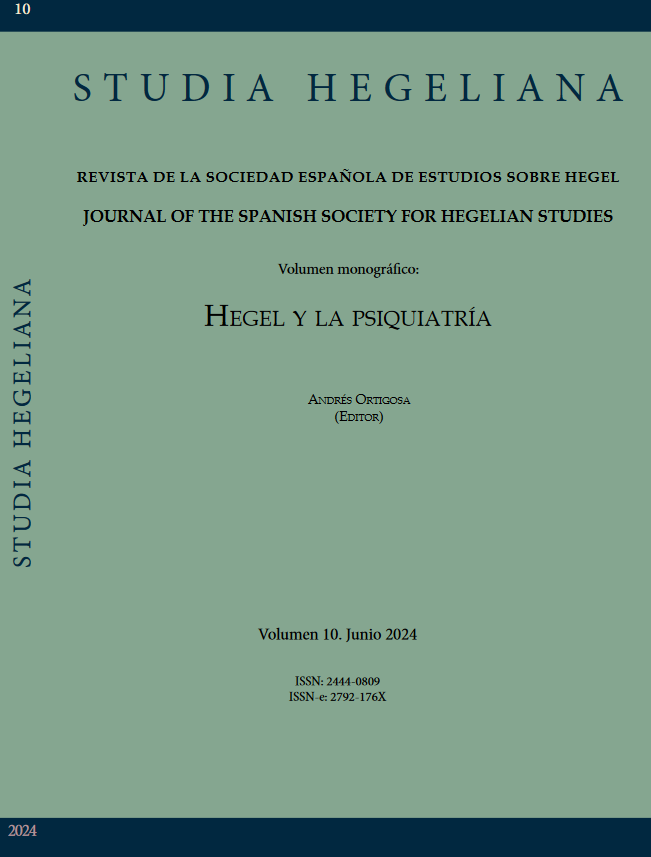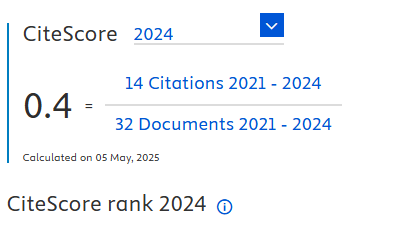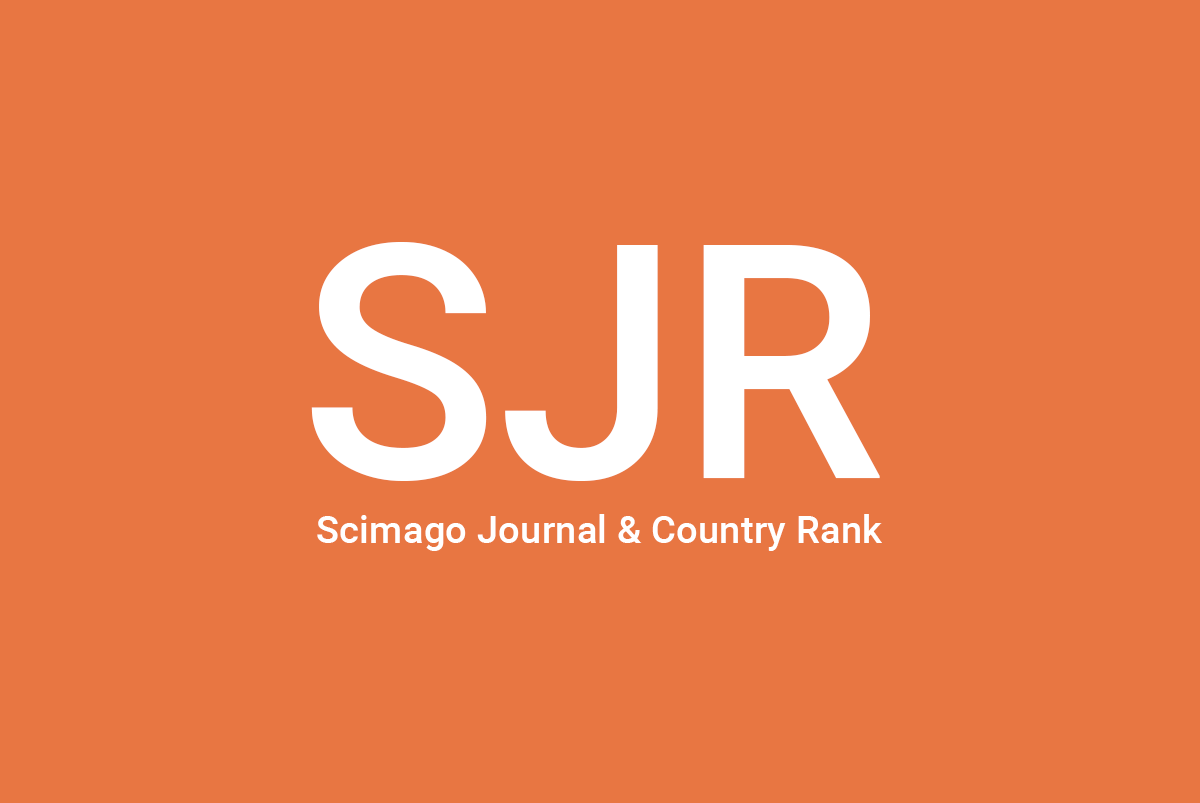Is the Psychiatrist a Good or Evil Genius for her Patient According to Hegel?
DOI:
https://doi.org/10.24310/stheg.10.2024.18126Keywords:
Consciousness, Genius, G.W.F. Hegel, Madness, PsychiatryAbstract
In this paper, I claim that to understand Hegel’s theory of psychiatric treatment, we must frame the relation between the psychiatrist and her patient using Hegel’s concept of genius as developed in the Anthropology section of the Encyclopedia (§405). As I argue, this notion of genius is both complex and ambiguous, since Hegel presents examples both of good and evil geniuses. What is interesting is that the psychiatrist can potentially correspond to both figures, which reveals what is perhaps Hegel’s greatest contribution to contemporary psychiatry as a practice: the imperative for the practitioner to reflect on its own motivation in the treatment, its own role of authority and, conversely, the condition of its patients.
Downloads
Metrics
Publication Facts
Reviewer profiles N/A
Author statements
Indexed in
-
—
- Academic society
- N/A
- Publisher
- Universidad de Málaga
References
Berthold-Bond, Daniel. Hegel’s Theory of Madness. Albany: SUNY Press, 1995.
Bichat, Xavier. Recherches physiologiques sur la vie et la mort, Verviers, Marabout, 1973.
Burdach, Karl Friedrich, Propädeutik zum Studium der gesammten Heilkunst, Leipzig, Breitkopf & Härtel, 1800.
Chaput, Emmanuel, « Hegel lecteur de Bichat, ou comment la raison spéculative fait d’une distinction d’entendement un moment conceptuel du vivant », Symposium, vol.22, no.1, Printemps/Spring 2018, p.159-186.
Chaput, Emmanuel. “Madness, Habit and the Genius. On Hegel’s Theory of Embodiment”, Idealistic Studies, vol.53, no.2, 2023, p.99-128. DOI: 10.5840/idstudies20231026156
Chaput, Emmanuel, « S’éduquer à travers l’autre : philosophie du perfectionnement, humanisme et conscience de soi chez G.W.F. Hegel et Germaine de Staël », Cahiers Staëliens, no.73, 2023, p.51-76.
DeVries, Willem A., Hegel’s Theory of Mental Activity, Ithaca, Cornell University Press, 1988.
Dryden, Jane. “Hegel’s Anthropology: Transforming the Body”. In Hegel’s Encyclopedia of the Philosophical Science, ed., Sebastian Stein & Joshua I. Wretzel, 127-47, Cambridge: Cambridge University Press, 2021.
Ferrarin, Alfredo, Hegel and Aristotle, Cambridge, Cambridge University Press, 2004.
Greene, Murray. Hegel on the Soul. The Hague: Martinus Nijhoff, 1972.
Hegel, G.W.F. Gesammelte Werke. Im Auftraf der Deutschen Forschungsgemeinshaft hrsg. v. der Rheinisch-Westfälischen Akademie der Wissenschaften, Hamburg: Meiner 1968ss.
G.W.F. Hegel, Philosophy of Mind, trans. W. Wallace & A.V. Miller, Oxford, Oxford University Press, 1971
Janssen, Diederik F. “Naming Psychiatry: Apropos Earliest Use oft he Term by Karl Friedrich Burdach (1800)”, History of Psychiatry, vol.34, no.3, 2023, 231-48.
Kraepelin, Emil, Einführung in die psychiatrische Klinik, Leipzig, Johann Ambrosius Barth, 1901.
Kring, Ann M. et al. Abnormal Psychology. Hoboken: Wiley, 2010.
Locke, John, An Essay concerning Human Understanding, Oxford, Oxford University Press, 1985.
Magee, Glenn Alexander. “The Dark Side of Subjective Mind.” In Essays on Hegel’s Philosophy of Subjective Spirit, edited by David S. Stern, 55-69. Albany: SUNY Press, 2013.
McGrath, Sean J., “Madness as a Philosophical Problem in Hegel”. In Mad/Bad/Sad: Philosophical, Political, Poetic and Artistic Reflections on the History of Madness, edited by Gonzalo Araoz, Leyden, Brill, 2012, 27-33
Mowad, Nicholas. “Awakening to Madness and Habituation to Death in Hegel’s ‘Anthropology’.” In Essays on Hegel’s Philosophy of Subjective Spirit, edited by David S. Stern, 87-105. Albany: SUNY Press, 2013.
Novakovic, Andeja. “Hegel’s Anthropology.” In The Oxford Handbook of Hegel, edited by Dean Moyar, 407-23. Oxford: Oxford University Press, 2023.
Reid, Jeffrey. Real Words. Language and System in Hegel. Toronto: University of Toronto Press, 2007.
Reid, Jeffrey. “How the Dreaming Soul Became the Feeling Soul.” In Essays on Hegel’s Philosophy of Subjective Spirit, edited by David S. Stern, 37-54. Albany: SUNY Press, 2013.
Reil, J.C., Rhapsodieen über die Anwendung der psychischen Curmethode auf Geisteszurrüttengen, Halle, Curtschen Buchhandlung, 1803.
Reil, J.C. „Über den Begriff Medicin und ihre Verzweigugen, besonders in Beziehung auf die Berichtigung der Topik der Psychiaterie“, Beyträge zur Beförderung einer Kurmethode auf psychischem Wege, no.1, 1808, p.161-279.
Richards, Robert J. The Romantic Conception of Life, Chicago, The University of Chicago Press, 2002.
Tubbs, Nigel. “Hegel’s Educational Theory and Practice”, British Journal of Educational Studies 44, no. 2 (1996), 181-99.
Wenning, Mario. “Awakening from Madness” In Essays on Hegel’s Philosophy of Subjective Spirit, edited by David S. Stern, Albany: SUNY Press, 2013, 107-19
Downloads
Published
How to Cite
Issue
Section
License
Copyright (c) 2024 Emmanuel Chaput

This work is licensed under a Creative Commons Attribution-NonCommercial-ShareAlike 4.0 International License.
This journal provides immediate free access to its content under the principle of making research freely available to the public. All contents published in Studia Hegeliana. Journal of the Spanish Society for Hegelian Studies, are subject to the Creative Commons Attribution-NonCommercial-ShareAlike 4.0 licence (specifically, CC-by-nc-sa), the full text of which can be found at <http://creativecommons.org/licenses/by-nc-sa/4.0>. Derivative works are therefore permitted as long as they are not used for commercial purposes. The original work may not be used for commercial purposes. The journal is not responsible for the opinions expressed by the authors of the works published in it.
It is the authors' responsibility to obtain the necessary permissions for images that are subject to copyright.
Authors whose contributions are accepted for publication in this journal retain the copyright. It is non-exclusive right to use their contributions for scholarly, research and educational purposes, including self-archiving or deposit in open access repositories of any kind.
Since volume 7 of 2021 the journal Studia Hegeliana has changed the copyright. Since that year the authors have retained the copyright.
The electronic edition of this journal is published by the Editorial de la Universidad de Málaga (UmaEditorial), being necessary to cite the source in any partial or total reproduction.







244.png)






















